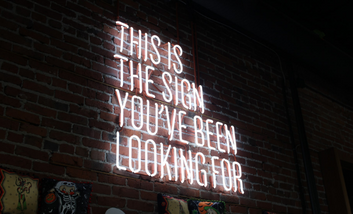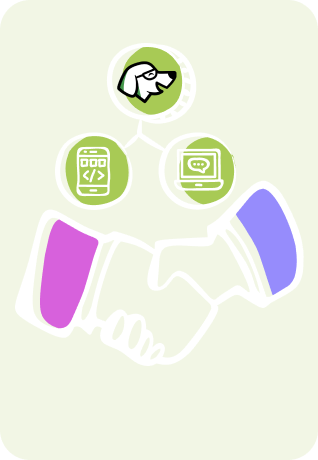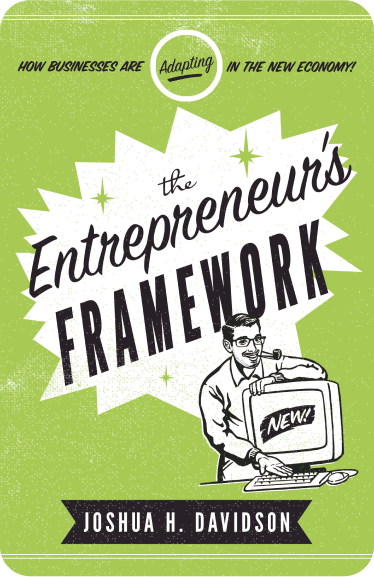Dating apps like Tinder, Hinge, and Badoo are almost inescapable for single people around the world.
As of 2021, over 300 million people worldwide use them. The amount of money they make and the number of users have only grown over the past few years.
However, that doesn’t mean that these apps don’t have big issues. Let’s take a look at some of the biggest complaints and troubling statistics surrounding these apps.
Many People Use Dating Apps, But Hate Using Them
Over the past ten years or so, a thinkpiece has been published almost every day by someone who hates using dating apps.
The majority of them more or less say this:
Tinder and dating apps like it were ushering in a new, dystopian romantic landscape in which sex was the result of an algorithm and relationships were almost never actually formed.
Studies have actually shown that the more we use dating apps, the less happy we are.
On top of this, the rise of scam users and even suspicious activity from the apps themselves have led to controversy.
Developers and entrepreneurs are already trying to figure out what comes next for dating apps.
Let’s take a look!
The Rise of Dating App Scammers And Other Criminals
This has always been somewhat of an issue, but it’s blown up lately. In response to the pandemic, digital scams have soared. Scammers have taken billions globally from users with fleeceware apps.
Now, they have started abusing traditional dating apps in large numbers to run devastating cons.
24-year-old Nicole Hutchinson lost nearly $400,000 to a Hinge crypto scammer, who took advantage of her and her father. And she is not the only one.
The FBI released a report showing that Americans lost about $1 billion to romance scammers in 2021.
Romance scams reported to the FTC also went up 80% in 2021, but both the FTC and FBI warn that these numbers are probably low. According to Emma Fletcher, a Federal Trade Commission analyst:
“The bottom line is most consumers are not reporting fraud when it happens, and romance scams may be particularly unlikely to be reported because there can be a lot of embarrassment around it.”
Within the last few years, there have also been a number of murders and kidnappings of female dating app users around the world. These apps have also been tied to sex trafficking.
Specifically, the Australian government has been putting pressure on these companies to do more to protect female users from violence.
What Can Be Done?
It would be difficult for apps to crack down on dating app scammers without making the apps unpleasant for everyday users.
While some offer variants of identify verification options, how much information should Tinder or Bumble really be able to ask you for? There are a wide variety of reasons why people may use nicknames on these apps, and many are not nefarious.
Currently, apps are mostly putting the responsibility on users to look out for scammers and avoid them. According to the FTC, most romance scammers use this formula:
-They tell you they work abroad or travel often for work.
-You are lured in with an emotional connection and false promises.
-They start asking for money.
There are a wide variety of reasons they will give for needing money. This can include paying for surgery, paying for a plane ticket to see you, and even investing in cryptocurrency.
In this one chilling case, an online romance scammer even faked their own kidnapping as part of their con.
Tinder’s Controversial Age-Based Pricing
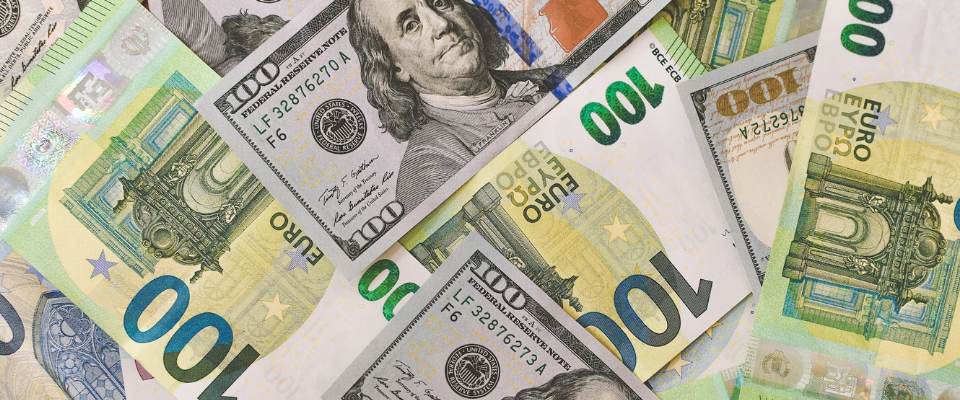
Tinder has had its share of controversies over the years. One of them, which has recently been resolved, is the app charging older users way more than younger users for Tinder+.
A report from Mozilla and Consumers International showed that paying users between 30 and 49 were charged on average 65% more in many countries.
This includes the United States, the Netherlands, New Zealand, Korea, and India. To uncover this, they used mystery shoppers around the world.
While Tinder claimed that they did this because students and young career professionals have less money, the report showed that the app’s pricing seemed to vary almost randomly.
In New Zealand, where the mystery shoppers were quoted a total of 25 different prices, the lowest quoted price was $4.95, while the highest was $24.54, according to the report. In the Netherlands, there were 31 different prices, with the lowest at $4.45 and the highest at $25.95.
Over the years, Tinder has even been hit with class-action lawsuits about this. As a result, they finally announced that they will get rid of their age-based pricing.
What Comes Next For Dating Apps?
Often, innovators see problems that already exist, and work to fix them. In the world of dating apps, one of the most famous cases of this is Whitney Wolfe Herd.
Herd founded Bumble to center women, in response to the widespread unchecked harassment of women on other apps. Currently, her app is one of the leading dating apps in the US.
So, what have dating app creators and innovators been working on?
The Bar
This New York and London-based app may be the answer to dating app fatigue. Interestingly, this app can only be used one day a week.
This app is very different, as its goal is to not get users sucked into to endlessly swiping, which is shown to make people unhappy over time. It hosts meetups once a week at different bars and users go to connect in person.
While other apps offer similar mixers for singles, including Bumble, this is the only one that is only available on Thursdays. App users only have 24 hours to get to know each other, and at the end of the day, everything resets.
This is meant to create real-life connections, rather than trap users in an endless cycle of in-app messaging that goes nowhere. This app would also be very difficult for romance scammers to exploit.
Fourplay
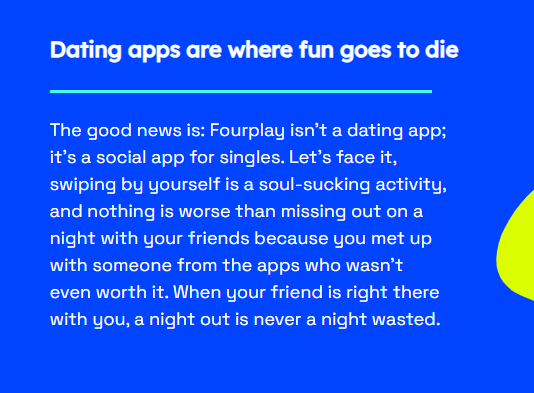
This app specifically for double dates and group dating has made headlines this year. This is because it had an almost 10,000-person waitlist before it was even launched. Singles and couples can meet people to go on double dates with through the app.
According to app co-founder Danielle Dietzek:
“We very intentionally designed Fourplay so that all matches happen as a group and there’s no one-on-one dating to mitigate the pressure and anxieties that come with dating.”
Tinder actually used to have a feature similar to Fourplay, which they abandoned in 2017.
There are numerous pros and cons to this. One pro is that group dating leaves less room for people to scam or harass others. Also, if things go well, users get to meet new friends and a new partner at the same time.
However, for the socially anxious, this may be a lot of new people to worry about meeting all at once. Also, coordinating four separate people’s schedules can also pose some challenges.
Final Thoughts
Something interesting to note about the next generation of dating apps is that they are more actively pro-social.
Many of the complaints about the big apps are that they don’t actually lead to relationships. People go on them to make real connections and instead find unfulfilling hookups, scammers, harassment, discrimination, and endless swiping.
If you think about it, this makes sense. After all, if everyone on these apps found love in a day, who would pay to use them? Usually, people only pay to use dating apps after the free version fails them.
Who would keep swiping? If the apps actually worked, no one would be on them for very long.
The next generation of dating apps, in general, is more focused on getting you off of the apps. This is an interesting concept.
Can an app that’s aim is to get users off of it succeed?
What do you think? Comment below.
Since 2009, we have helped create 350+ next-generation apps for startups, Fortune 500s, growing businesses, and non-profits from around the globe. Think Partner, Not Agency.
Find us on social at #MakeItApp’n®





